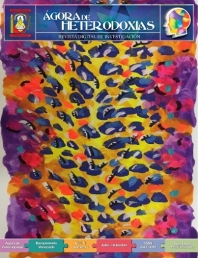El patrimonio cultural en el contexto del aprendizaje móvil (M-Learning)
Palabras clave:
patrimonio cultural, aprendizaje móvil, M-learning, mediación tecnológicaResumen
El documento expone una perspectiva relacionada con el uso pedagógico y didáctico de las tecnologías móviles, debido a los altos niveles de apropiación de los Smartphone por parte de los jóvenes, como una fuente de aprendizaje innovador y significativo, para el fortalecimiento de competencias para el afianzamiento de las identidades socio-culturales. Para ello, se consideran los principios expuestos por la Organización de las Naciones Unidas (ONU) y su Agenda 2030 sobre los Objetivos de Desarrollo sostenible, así como el proyecto de la UNESCO sobre aprendizaje móvil (2019), que apuntan hacia una educación de calidad, inclusiva, accesible, deslocalizada y ubicua, fortalecida con mecanismos innovadores para interactuar con contenidos patrimoniales, como un elemento central de la sustentabilidad y la construcción de identidades, a partir de mediaciones tecnológicas y criterios pedagógicos, partiendo del supuesto que las tecnologías de información y comunicación y los dispositivos móviles ofrecen posibilidades para innovar en las pedagogías y estrategias didácticas que se establecen dentro y fuera del aula de clase y que pueden aprovecharse para la enseñanza del patrimonio cultural en contextos universitarios. Las conclusiones apuntan a la práctica de múltiples estrategias didácticas impregnadas de innovación y dinamismo, para generar aprendizajes significativos y para toda la vida.
Descargas
Citas
Briede, J.C., Leal, I.M., Mora, M. L., y Pleguezuelos, C.S., (2015). Propuesta de Modelo para el Proceso de Enseñanza Aprendizaje Colaborativo de la Observación en Diseño, Utilizando la Pizarra Digital Interactiva (PDI), Formación Universitaria, (3), 15-26. doi: 10.4067/S0718-500620150003000038. Recuperado de: https://scielo.conicyt.cl/ scielo.php?script=sci_abstract&pid=S0718-50062015000300003&lng=es&nrm=iso
Fiad, S.B., y Galarza, O.D., (2015). El Laboratorio Virtual como estrategia para el proceso de Enseñanza-Aprendizaje del concepto de Mol. Revista Formación Universitaria, 8(4), 3-14. doi: 10.4067/S0718-50062015000400002. Recuperado de: https://scielo. conicyt.cl/scielo.php?script=sci_arttext&pid=S0718-50062015000400002
Gómez-Trigueros, I. y Binimelis. (2020). Aprender y enseñar con la escala del mapa para el profesorado de la “Generación Z”: la competencia digital docente. Ar@cne: Revista electrónica de recursos en internet sobre geografía y ciencias sociales, (24)234, 1-18 pp. Recuperado de: https://www.raco.cat/index.php/Aracne/article/view/362307
Organización de las Naciones Unidas (ONU). (2015). Objetivos de desarrollo sostenible. Recuperado de: https://www.undp.org/content/undp/es/home/sustainable-development-goals.html
Rico, M. y Agudo, J. (2016). Aprendizaje móvil de inglés mediante juegos de espías en Educación Secundaria. Revista RIED (19)1, pp 121-139 . Recuperado de: http://e-spacio.uned.es/fez/eserv/bibliuned:revistaRied-2016-19-1-7060/Aprendizaje_movil_de_ingles.pdf
Torres, J.; Infante, A. y Torres, P. (2015). Aprendizaje móvil: perspectivas. Revista RUSC. Universities and Knowledge Society Journal, (12)1, enero-febrero, pp. 38-49. Recuperado de: https://www.redalyc.org/pdf/780/78033494005.pdf
UNESCO. (2012). Activando el aprendizaje móvil: Temas globales. Recuperado de: Recuperado de: https://unesdoc.unesco.org/ark:/48223/pf0000216451_spa
UNESCO (2015a). Objetivo n.4 de desarrollo sostenible: Educación de calidad. Recuperado de: https://www.un.org/sustainabledevelopment/es/wp-content/uploads/sites/3/2016/ 10/4_Spanish_Why_it_Matters.pdf
UNESCO (2015b). Objetivo n.11 de desarrollo sostenible: Ciudades y comunidades sostenibles. Recuperado de: https://www.un.org/sustainable development/es/ cities/
UNESCO (2016). Proyecto: mejores prácticas de aprendizaje móvil. Recuperado de: https://es.unesco.org/themes/tic-educacion/aprendizaje-movil/fazheng
UNESCO (2017). Declaración de Quingdao. Estrategias para aprovechar las TIC para lograr la educación 2030. Recuperado de: https://unesdoc.unesco.org/ ark:/48223/ pf0000253061
UNESCO (2018). Aprendizaje móvil: competencias para un mundo más conectado. Recuperado de: https://www.un.org/sustainabledevelopment/es/wp-content/uploads/ sites/3/2016/10/4_Spanish_Why_it_Matters.pdf
Wang, M., Shen, R., Novak, D. y Pan, X. (2009). The impact of mobile learning on students' learning behaviours and performance: report from a large blended classroom. British Journal of Educational Technology, 40(4), 673-695. doi: 10.1111/j.1467-8535.2008.00846.x
Zea-Verdín, A.; Velasco-Aragón, I. y Páez-Gutiérrez, M. (Coord.). (2016). Los retos de la docencia ante las nuevas características de los estudiantes universitarios. Universidad Autónoma de Nayarit-México, Volúmen XI. Recuperado de: http://www.ecorfan.org/ proceedings/CDU_XI/PROCEEDING%20TOMO%2011.pdf#page=126
Publicado
Cómo citar
Número
Sección
![]() Los autores mantienen los derechos para reutilizar el artículo para fines docentes y de investigación. Los lectores y usuarios pueden leer, descargar, copiar, distribuir, imprimir, buscar o usar sus publicaciones con cualquier propósito legal, sin ninguna barrera financiera, legal o técnica, además de las que son inherentes de las que implica acceder al Internet. Siempre y cuando preserven el derecho de los autores de ser adecuadamente reconocidos y citados Ágora de Heterodoxia no se hace responsable de la información suministrada por colaboradores, la cual no constituye, necesariamente, el punto de vista de la publicación.
Los autores mantienen los derechos para reutilizar el artículo para fines docentes y de investigación. Los lectores y usuarios pueden leer, descargar, copiar, distribuir, imprimir, buscar o usar sus publicaciones con cualquier propósito legal, sin ninguna barrera financiera, legal o técnica, además de las que son inherentes de las que implica acceder al Internet. Siempre y cuando preserven el derecho de los autores de ser adecuadamente reconocidos y citados Ágora de Heterodoxia no se hace responsable de la información suministrada por colaboradores, la cual no constituye, necesariamente, el punto de vista de la publicación.
Derechos del/de autor/es a partir del año de publicación
Esta obra está bajo la licencia:
Creative Commons Reconocimiento-NoComercial-CompartirIgual 4.0 Internacional (CC BY-NC-SA 4.0)




